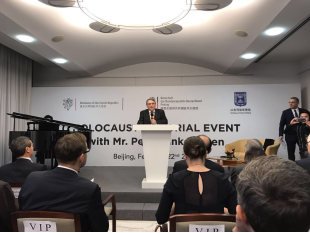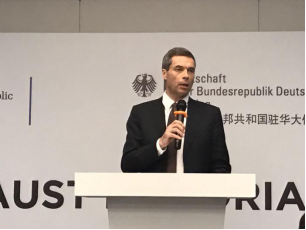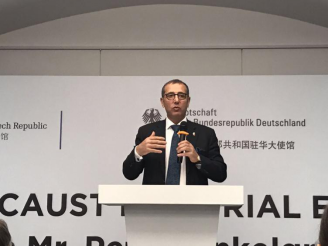By Tom McGregor, CNTV Panview Opinion Page commentator and editor
In the immediate aftermath of World War II., Germany faced humiliation as details emerged the Nazis were responsible for murdering over 6 million Jews, known as the Holocaust.
The new German government, wishing to restore ties with the global community, had to confront its ugly past.
Berlin in the past few decades has accepted historical responsibility over the Holocaust by engaging in reconciliation and trust to make Germany’s international relations great again.
After surrendering to Allied Forces, Germany placed special emphasis on constructing a stronger bond with its European neighbors, particularly France and the United Kingdom.
Germany had taken the initiative to apologize to the Jewish people, while Germans would remember its historical past to learn from the devastation inflicted upon so many innocent people.
Berlin has marked Holocaust Memorial Day annually as a time for remembrance.
China joins in
Although China is not part of Europe and only a few Jewish people reside here, Beijing supports Germany in building bridges with Asia and in apologizing for the Nazi nightmare.
On Wednesday (Feb. 22), the Embassy of the Czech Republic, together with the Embassy of Germany and the Embassy of Israel in Beijing jointly hosted an event to commemorate Holocaust Memorial, inviting special guest speakers: Czech Republic Amb. Bedrich Kopecky, Federal Republic of Germany Amb. Michael Clauss, Israel Amb. Zvi Heifetz and author Peter Finkelgruen.

Czech Republic Amb. Bedrich Kopecky delivers a speech Photo/Li Shouen
“Germany must face up to history and apologize,” said Amb. C lauss. “Germans will always take responsibility for the Holocaust.”
He added, “reconciliation is a political cornerstone of Europe,” which means the country has to “accept accountability for its crimes.”

Germany Amb. Michael Clauss delivers a speech Photo/Li Shouen
Germany’s envoy to China highlighted how Berlin has “regained the trust of other European countries” by touting positive messages of reconciliation, hope and peace.
Jewish refugees in Shanghai
Israeli Amb. Zvi told the audience at the Czech Republic Embassy that his country holds a special connection to China.

Israel Amb. Zvi Heifetz delivers a speech Photo/Li Shouen
During World War II. many Jewish people in Europe could attain exit visa documents from China’s Consulate-General in Vienna Ho Feng-shan to migrate to Shanghai for safety.
At the time, Japanese Occupational Forces seized control of Shanghai, but permitted stateless refugees to live in a designated district. The neighborhood for Jewish refugees was called, Shanghai Ghetto.
Amb. Zvi cited his family ancestry and pointed out some of his ancestors formerly lived in Harbin, northeast China’s Helionjiang Province. A day before attending the Holocaust Memorial event, he visited Harbin, his Chinese ancestral homeland.
Author reconnects to Shanghai
Along with Amb. Zvi, the acclaimed Germany-based book author Peter Finkelgruen, a former correspondent for Deutsche Welle, has a special connection to China.
He gave a reading of his book, ‘Elrkonig’s Empire, The Tale of a Deception’ at the Czech Embassy.

Peter Finkelgruen reads from his book Photo/Li Shouen
He’s a Chinese native, born in Shanghai in 1942, a year before his father died. He lived with his mother and they were poor.
He explained they were so poor in Shanghai that his family could only take a shower when it rained, where they would find an enclosed room without a roof.
Accordingly, Jewish families in the Nazi era may have escaped the concentration camps but they struggled to flee from poverty. Nevertheless, the Jewish people in Shanghai remained a closely-knit community and took care of their own.
Never forgetting haunting memories
Berlin has pledged never to forget the atrocities committed by the Nazi regime so as to regain trust of the world. In a more inter-connected globalized society, no country can isolate itself from the rest of the world.
Germany is making amends for its historical past and setting as a prime example for why other nations to act as bridge builders, not bridge burners.
Germany holds a dark history, but by confronting the historical horrors head on, Berlin can take steps to move forward on a brighter future and work more closely with other nations to spread global prosperity and peace.

Tom McGregor, CNTV Panview Opinion Page commentator and editor
(The opinions expressed here do not necessarily reflect the opinions of Panview or CCTV.com)

Panview offers a new window of understanding the world as well as China through the views, opinions, and analysis of experts. We also welcome outside submissions, so feel free to send in your own editorials to "globalopinion@vip.cntv.cn" for consideration.















